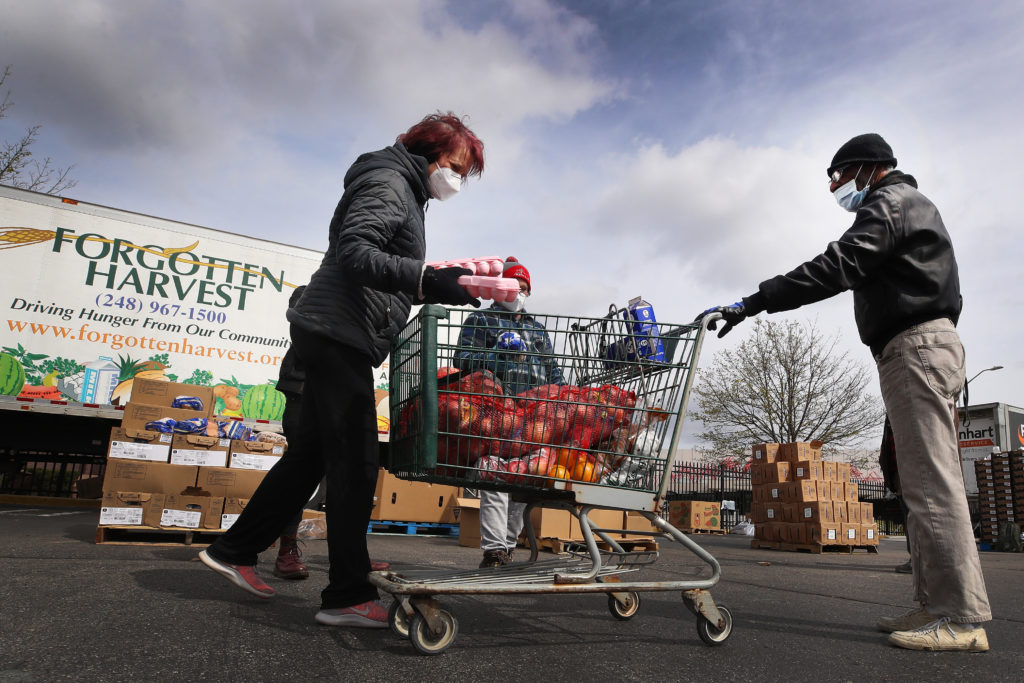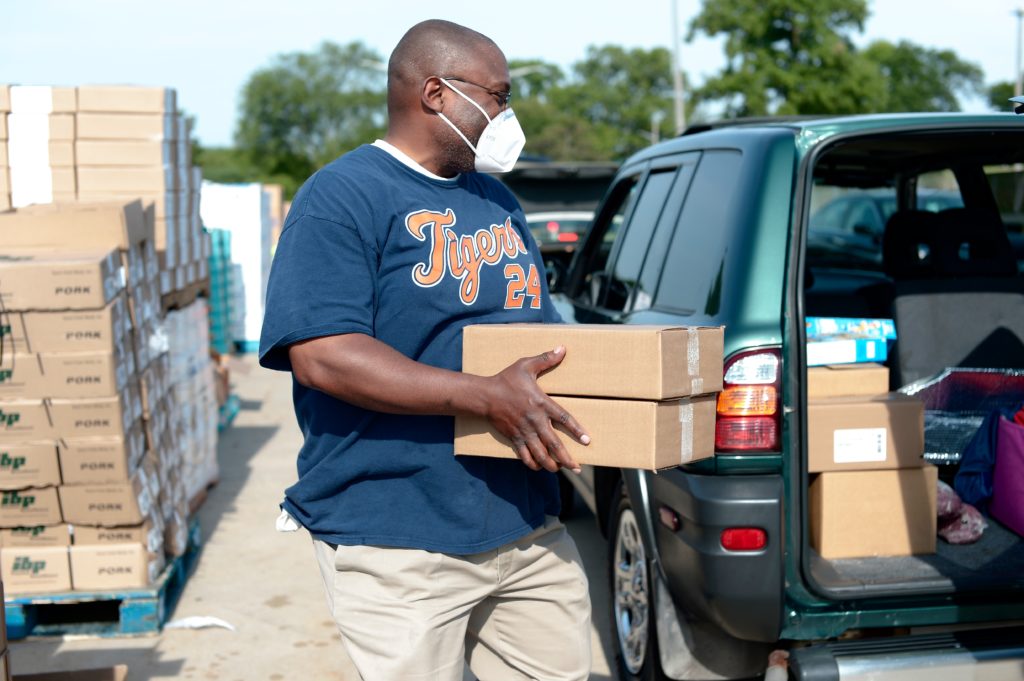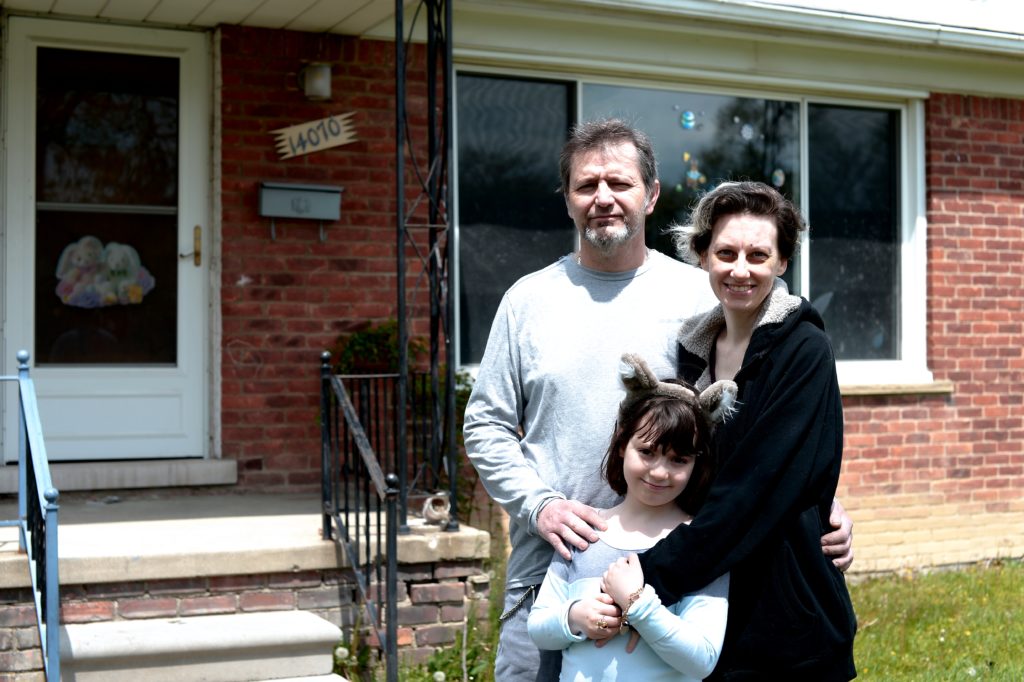Forgotten Harvest and United Way fight hunger together
Published on November 5, 2020 in Crisis Relief
When Omar arrived at Forgotten Harvest’s On the Go Mobile Pantry at the Detroit Institute of Arts in Detroit, he was amazed by the amount of food he received for his family.
For the next week, food would be one less thing for him to worry about.
Omar — like so many in our region and beyond — lost his job at the beginning of the COVID-19 pandemic. As a result, necessities like food became harder to come by.

DETROIT, MICHIGAN – APRIL 14: A volunteer for Forgotten Harvest loads food into a cart on April 14, 2020 in Detroit, Michigan. The organization distributes food throughout the metro area, which has seen an uptick in demand due to the COVID-19 pandemic. (Photo by Gregory Shamus/Getty Images)
Saving Our Selves
United Way for Southeastern Michigan aims to create stable households where children can thrive and where all their basic needs are met. For the 44 percent of families in our region that were already struggling to make ends meet, the pandemic added yet another roadblock to stability.
Forgotten Harvest was one of nine organizations that received a total of $2.8 million in funding through United Way for Southeastern Michigan following the Saving Our Selves: A BET COVID-19 Relief Effort fundraiser held in April. In partnership with United Way chapters across the country, the grant funding targets Detroit and other cities where the African American population has been disproportionately impacted by COVID-19.
In April, when the U.S. economy lost 20.5 million jobs, the unemployment rate for African American workers spiked to 16.7 percent, the highest rate since 2010, according to the Bureau of Labor Statistics.
Additionally, nearly 40 percent of the COVID-19 related deaths in Michigan have been African Americans despite representing only 13.6 percent of the state’s population.
As a result, families like Omar’s have struggled to get by.
“Because of the help I am getting from Forgotten Harvest, I’ve been able to take care of myself and family,” Omar said.
‘Like a switch was flipped’
Forgotten Harvest has been fighting hunger and food insecurity in metro Detroit since 1990 by rescuing surplus food from grocery stores, markets, restaurants, caterers, and more. The donated food, which would otherwise go to waste, is delivered free-of-charge to area emergency food providers.
The organization typically feeds 584,000 people each year on average, but 2020 has proven to be a year unlike any other.
Christopher Ivey, the organization’s communications director, said that when the COVID-19 pandemic hit Michigan, “it was like someone flipped a switch.”
He estimates Forgotten Harvest needed to feed 50 percent more families and individuals within a matter of days.
“Our entire model is built around rescuing surplus food and suddenly there was no surplus food,” Christopher said. “Shelves were empty. More people needed more food at the same time many of the agencies and food pantries they rely on weren’t open.”
Before the pandemic, Forgotten Harvest supplied 250 food pantry partners. By early April, they were down to supplying only the 30 pantries that remained open.

A Forgotten Harvest volunteer packs food into a family’s car. Volunteers are crucial to the nonprofit’s work, but dwindled due to COVID-19. Funding from United Way helped them pay temporary staff to help.
All-hands approach
The BET grant allowed Forgotten Harvest the flexibility and funds to help open 17 On the Go Mobile Pantries across metro Detroit, which operate using a truck-to-trunk distribution model that allows for safe social distancing.
“Forgotten Harvest has a long history of getting food to a large number of people in need quickly, thanks to their strong organizational infrastructure and relationships with community-based organizations,” said Megan Thibos, Director, Economic Mobility Initiatives at United Way for Southeastern Michigan. “The pandemic turned all of that infrastructure upside down and they’ve done a fantastic job of rapidly adapting their distribution model to the new reality in order to continue to serve the community during this exceptionally difficult time.”
Forgotten Harvest typically enlists the help of more than 16,000 volunteers each year, but with stay-at-home orders in place and many seniors self-quarantining, the volunteer supply dwindled.
Staff members stepped in to help in every role from packing boxes to making calls to source smaller pallets of food.
United Way funding also allowed the organization to hire temporary help. 1-800-Self-Storage donated warehouse space to store food and supplies and have volunteers create the food boxes while remaining socially distanced, for several months.
“We wouldn’t have been able to what we did without the generous support of the community and great partners,” Christopher said.
Focusing on food and wellness
Forgotten Harvest’s pantry partners and distribution sites provide 45 to 65 pounds of food to families each week. Each box includes a diverse mix of protein, dairy, canned goods, grains, cereal and snacks.
Kimberly Williams turned to one of the Detroit mobile pantries when her husband — the family’s main breadwinner — lost his job due to the pandemic.
“It’s been hard,” Kimberly said. “The boxes Forgotten Harvest gives out provide us with meats and fruits, so this all helps us out. Buying a little bit at the store, and using what we get from Forgotten Harvest, we can prepare a healthy meal.”
Anyone in need can visit the mobile locations to receive food free of charge.
“Forgotten Harvest means something different to each family we serve,” Christopher said. “Sometimes we’re the only source of food. For others, we’re a supplemental bridge to help them get from paycheck to paycheck. Everybody’s challenge is different.”

Bonnie and her family relied on help from Forgotten Harvest to get through tough times with a tight budget after her husband’s business suffered losses due to the COVID-19 pandemic.
Preparing for an uncertain future
With COVID-19 cases on the rise in Michigan, the team at Forgotten Harvest is working to prepare for increased need.
The organization received additional BET grant funding in September, which will allow them to better plan and help even more people should the need arise.
Christopher added that not knowing where your next meal is coming from creates a level of stress that no one should have to deal with.
Bonnie, an Oak Park resident who was struggling to feed her family after work at her husband’s collision shop dwindled, recently began receiving weekly food distributions to help feed her kids.
“They come first,” she said. “I don’t want them to ever feel what it’s like to go hungry.”
To learn more about United Way for Southeastern Michigan’s COVID-19 response and ongoing relief efforts, click here.